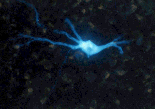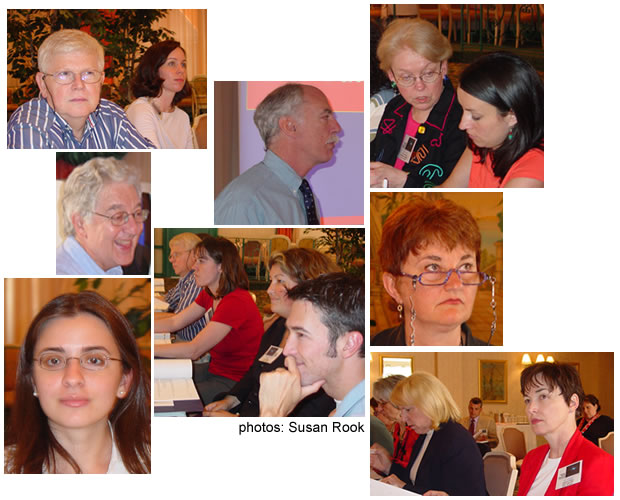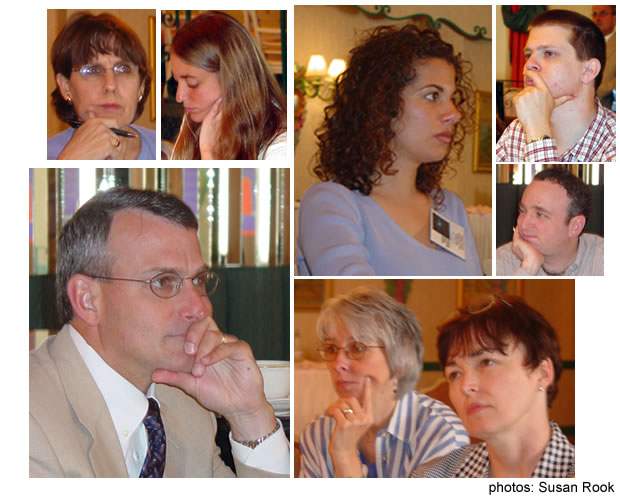Vanessa Arrington
Foreign Correspondent
Associated Press
Bogota, Colombia
Doris
Bloodsworth
Reporter
Orlando Sentinel
Orlando, Florida
Susan
Brink
Senior Writer
US News & World Report
Washington, D.C.
Jennifer
Cannon
Project Manager
JMH Education, Marketing
New York, New York
Allison
Colker
Policy Associate
National Conference of State Legislators
Washington, D.C.
Sarah
Clark
Reporter
Observer Newspapers
Kingwood, Texas
Jeff
Davis
Police and Courts Reporter
Danville Register & Bee
Danville, Virginia
Patricia
Duggan
HealthLink Producer
KING-TV News
Seattle, Washington
Karen
Garloch
Medical Writer
The Charlotte Observer
Charlotte, North Carolina
Thomas
J. Howard, Sr.
Staff Writer
Georgetown Times
Georgetown, South Carolina
|
|
Cheryl
Johnston
Journalism Student
College of Journalism, University of Maryland Leesburg, Virginia
Sofia
Kosmetatos
Journalism Student
College of Journalism, University of Maryland Greenbelt, Maryland
Colleen
Krantz
Reporter
The Des Moines Register
Des Moines, Iowa
Colleen
Marshall
Reporter
West Hawaii Today
Kailua-Kona, Hawaii
Jane
Meyer
Vice President / Client Services
JMH Education, Marketing
New York, New York
Constance
C. Prater
Medical Writer
Miami Herald
Miami, Florida
Jeff
Raymond
Staff Writer
Kerrville Daily Times
Kerrville, Texas
Mayrav
Saar
Medical Reporter
Orange County Register
Santa Ana, California
Sam
Skolnik
Reporter
Seattle Post-Intelligencer
Seattle, Washington
Brian
Vastag
Associate Editor
JAMA Medical News
Washington, DC
|
On animal models of addiction. . .
"An excellent presenter. Funny and lively."
"Very easy to understand. Nice to be brief. Good story ideas. Monkeys
and addiction is a surprising fact."
"This was extremely tempered and unbiased, which made it all the
more useful."
On
the history of drugs in the U.S. . .
"The historical perspective was fascinating and absolutely necessary
to understand the subject matter. Especially enjoyable were the vintage
ads." "Great background."
"Very good - loved the old advertisements."
"Very well presented and informative."
"Very informative."
"Very interesting."
"Really important to have this background to be prepared to understand
(and put in context) the rest of the workshop."
"This was very new information to me - it helped to hear the history
of these drugs and addiction treatment."
On
the neurobiology of addiction. . .
"A great lecturer . . . the presentation was a good big-picture
overview."
"Nice use of layman's language to describe complex topics."
"Content and style of presentation were excellent. This was a well-presented
introduction to the science of addiction as a brain disorder. I found
it essential to understanding pharmacology and genetics sections."
"The diagrams were helpful."
"A lot of information very easily told."
"Extremely informative. Great humor - lots of information."
"Really interesting and well-presented for those of us with nothing
beyond high school science. 'Journalist-friendly' in other words."
"Very interesting, easy to understand."
On
the pharmacology of addiction. . .
"The animation and adding pathways to the receptor diagrams one-by-one
were both helpful teaching tools."
"Great animation. Repetition is good for something this complicated.
Maybe time prohibits more repetition, but don't eliminate what you've
got."
"Very good explanation - good teacher - complicated concepts told
very simply."
"I liked and appreciated the audio/video component - even the repetition
- I have a much clearer picture of how fast and slow neurotransmitters
work and how they're related to addiction."
"You are a biology professor that makes sense. Keep it up."
"This is a difficult lecture to present to mostly non-bio majors.
. . . Still, it was an important lecture to hear. Great!"
On
the genetics of addiction. . .
"This workshop is essential. Genetics is one of the most interesting
elements of addiction (to me at least) and should be included in all
of your workshops."
"Enforcing the idea of addiction as a disease of the brain is useful
and this gave me a number of story ideas."
On
the personal side of addiction. . .
"Damn good speech! I can see that she's a powerful spokesperson."
"It couldn't be improved. Riveting and tremendously gutsy, brave."
"She was fabulous."
"Outstanding presentation."
"Her candidness was amazing. I would not have her change anything.
For a journalist, getting that level of candidness from a 'subject'
is rare, and this will help us approach our 'subjects' with more compassion
and knowledge."
"Great! Liked the placement after scientific to have the personal
side. The only way to improve would be to make it longer - allow more
time for questions and answers. Also if she could provide personal insight
into story ideas and how journalists could cover addiction it would
have been nice."
"Her honestly was helpful and admirable. Her personal experiences
do help me piece together the day's lectures."
"Very dynamic and enthusiastic."
"I gained more from this than everything else."
"She is an amazing, inspiring person and an essential component
of this program. Especially relevant for journalists, as a former CNN
anchor."
"Very moving and passionate."
On
the treatment of addiction. . .
"Good break from the first day's topics."
"Quite informative."
"He was outstanding."
"It was really helpful and clearly explained."
"Exceptional! This gave me several story ideas - I could have heard
more presentations on this - and more about the types of treatment -
detox, rehab, follow-up - and what's available where and why."
"[Would like] more information on whether treatment success varies
based on drug type."
"Excellent - no improvement needed!"
"First day led nicely into this session - answered all the questions
I think many of us are asking."
"Great - Very informative."
"Excellent, interesting, crucial in this workshop."
"Very lively and understanding - would like to see more resources
as part of this presentation (i.e., websites, studies.)"
On
welfare, addiction, and policy. . .
" Fascinating and important information."
"Very interesting. Interesting research."
"The information was really relevant and useful."
On
treatment medications. . .
"Probably my favorite lecturer. Fascinating, practical stuff. The
expert rather than an expert."
"Very informative, he's obviously a national authority."
"Good information - nicely done!"
"Allow more time since there was so much information."
"More time."
"Very interesting."
"Good info for medical reporters."
"This one could have used a bit more time. I would have liked to
hear more of his anecdotal information."
"This topic could've filled the whole day."
On
reliable sources of drug information. . .
"A good way to conclude the workshop. Keep this part in there each
year."
"Extremely practical - very helpful."
"Wide variety of resources - well done."
"I liked the dialogue, and the links. Perhaps this would have been
a good session in which to do a 'scenarios' discussion."
"Thank you! I am always looking for information on the web and
it's nice to know which sites are recommended."
"Thanks for printing out the homepages of the websites."
"Very useful websites, etc."
"This was great way to end the workshop."
Additional
Advice. . .
"Keep up the good work. The idea behind the program is sound. Tweak
it but don't dramatically change. I believe, given time, the program
will have a positive impact."
"Thank you very much!"
"Keep up the good work."
"This workshop organized and printed information better than any
other workshop I've attended. I will recommend it."
"Thanks for including all the speaker's slides in this package
- that is so helpful. And thanks for the business cards in back - and
all the names and emails of attendees. Great package! Thank you - excellent!"
"Great as it is."
"Very well organized workshop. Great and informative speakers."
"The
program is extremely legitimate, which I searched out myself beforehand,
but it may be useful to make that even more apparent on your website,
and the letter you send out (by focusing on the scientific aspect, the
lack of any religious/political bias, etc.) I imagine some journalists
suspect that there're "ulterior motives," and perhaps could
be pointed to the appropriate websites, etc., to confirm for themselves
that that's not the case."
"You
guys are pros."
"Keep
up the good work."
|
|
On the workshop overall. . .
"The workshop was sufficiently broad in scope and varied in topics.
I gained pretty much what I expected to gain from coming - namely a
new appreciation for how intractable addiction is and how behavior and
genetics and environment all play key roles. It was very helpful to
hear from scientists."
"It was terrific. Very informative. The knowledge I've gained as
well as the contacts will prove invaluable when I write drug-related
stories down the road."
"I had a feeling leaning toward addiction as disease. Workshop
has helped confirm and validate those feelings."
"Thank you!"
"Story ideas, depth of education."
"It exceeded my expectations. I learned a lot."
"The program more than met my expectations."
"It was not only well-run, but jam-packed with useful information
and ways to use the information."
"I now want to do a big 'Sunday Package' on the myths of addiction
and treatment and how people in my coverage area can get proper treatment."
"Extremely informative."
"The workshop exceeded my expectations. It was thorough, well-organized,
appropriately 'simplified' for journalists and extremely interesting.
I am very glad I attended."
"This was wonderful. Thank you for putting it on."
"It was the right size, number of participants; the presenters
were largely excellent and the location was superb. Too short - three
days."
"It will lead me not to take claims at face value from either side
of the debate - the issue of addiction is too complicated for that.
It has given me access to authoritative sources and new ideas for enterprise
stories."
"Points toward many resources."
"Definitely provided more details/contacts for future reference
and story ideas."
"I've gained a much deeper understanding of the biological factors
playing a role in addiction. Great information - communicated in an
easy, interesting manner. Can really use the knowledge and expand."
"I think the best result of this workshop will be to help journalists
avoid perpetuating the stereotypes our society has about drug addiction,
and drug addicts."
"I got a number of story ideas from this."
"Great sources to rely on in the future."
"The program has helped me recognize nuances and added a layer
of empiricism to my reporting. Now when someone says it's all genetic
or all behavioral, I'll know that it's somewhere in the middle, depending
on the addict."
"It has made me much more knowledgeable. And now I have practically
all the best resources at my fingertips."
"Expanded what I know; put me in touch with new sources."
"Gives me a stronger sense of doing more detailed or in-depth articles."
"Learned more specifics on how drugs affect the brain - more specifics."
"I have a better idea of where to turn for facts. I now understand
the differences between use, abuse and addiction. I now understand why,
chemically, people become addicted."
"With a ton of competition for health stories, it will make addiction
on the top again."
"I will still look for human interest stories - but I have the
better background to start from."
"I'll be able to include better background in my stories about
various studies into addiction."
"I have better overall understanding and will look at addiction
more holistically."
"There are so many issues to include. We received concrete studies
and analogies to utilize when writing."
"I think the big change will be that I will take addiction/drug
problems into consideration more often while doing stories on general
social issues."
"The program certainly gave me more resources and insight that
will inform my reporting."
"Sources and websites very helpful."
"My addiction and drug use stories are more likely to stem from
my criminal justice reporting, but when I have the chance to do some
enterprise work, I'll use material from the workshop. And I will give
more than lip service to treatment and recovery."
"Want to look at impact of drug abuse on law enforcement. How society
deals with problems, especially focused on my areas."
"I will write a column on my attendance here and something I learned
and I will look for stories. I have my editor's approval to start work
on a series of articles on drug addiction. Immediately will be using
materials. Would like to do further research on various topics."
"When writing stories about addiction, I will definitely use these
resources and likely call some of these scientists."
"The material reinforced, through scientific findings, the idea
of addiction as a disease, but helped me realize it's not as easy as
many would say to recover - it takes a tremendous amount of resources."
"It gave me a better sense of the research that is being done in
this area."
"I always suspected that there was more to addiction than meets
the eye, but this workshop gave me the facts to back up that hunch and
argue it to those who say otherwise."
"Comparing drug addiction to other chronic diseases was fascinating.
Enjoyed getting perspective of treating addiction as chronic disease,
especially since this has not yet gained acceptance in medical community.
Good to know where science is headed."
"Even mealtimes have been educational. It's great that the presenters
mix with the journalists and share additional info during downtime."
"Very well organized - good location - great speakers and conferees."
"This is an incredible information-packed experience."
"Step it up - this is a necessary service."
"Wonderful - great information - good chance to meet others and
learn more."
"Instructors are lively, interesting and articulate, and I'm amazed
by how much information was squeezed into two days."
What
June workshop participants liked most...
"The overall objective; the scope and variety of presentations
and lecturers; the overall intent of the program; the qualifications
of the organizers and presenters; and the emphasis on educating journalists
in order to improve addiction reporting."
"The variety and in-depth nature of the presentations."
"Dinner speaker’s talk; history; interaction with other reporters;
interaction with other professionals."
"The treatment lecture presented scientific data in best way; the
dinner speaker’s talk was most moving."
"Discussion, historical and pharmacological overviews, resource
presentation."
"The wealth of information, contacts, websites is wonderful. Thank
you for not overly dumbing down the science."
"The intense science education."
"Treatment, history lectures; talking with other reporters."
"Its focus on hard, scientific evidence, the variety of speakers,
tackling the tougher issues such as
chemical and genetic information."
"The small size of the group was very conducive to discussion,
networking, explaining all the issues from a variety of research areas.
Presenters were very good at explaining complex research in an understandable
way. Good job!"
"The accessibility and openness of all presenters."
"Treatment lecture and dinner speech."
"The research regarding alcohol - genetics, treatment and brain."
"The presenters are lively and interesting, all of the information
was relevant and up-to-date and the scholarship was greatly appreciated
(and crucial for attendance in my case.)"
"The information was presented in an easy-to-understand format,
and it was useful to talk informally after the presentations."
"New treatments - shift in treatment approach (chronic disease.)"
"Everything."
"Mingling
with the reporters/scientists; informed interactions and spin-off conversations."
|
David Friedman, Ph.D.
Director, Addiction Studies Program for Journalists
Professor
Department of Physiology and Pharmacology
Wake Forest University School of Medicine
Winston-Salem, North Carolina Sue
Rusche
Co-Director
Addiction Studies Program for Journalists
Chairman, President, and CEO
National Families in Action
Atlanta, Georgia
Herbert
Kleber, M.D.
Professor of Psychiatry
Columbia University
Director, Division on Substance Abuse
College of Physicians and Surgeons and the New York State Psychiatric
Institute
New York, New York
Donna
M. Kozlowski
Coordinator, Addiction Studies Program for Journalists
Administrative Secretary
Wake Forest University School of Medicine Department of Physiology and
Pharmacology
Winston-Salem, North Carolina
Tom
McLellan, Ph.D.
Director, Treatment Research Institute
University of Pennsylvania
Philadelphia, Pennsylvania
|
|
Lisa R. Metsch, Ph.D.
Associate Professor
University of Miami School of Medicine
Department of Epidemiology & Public Health
Miami, Florida Susan
Rook
Recovery Advocate
Alexandria, Virginia
Rochelle
“Shelly” Schwartz-Bloom, Ph.D.
Professor of Pharmacology
Duke University Medical Center
Department of Pharmacology & Cancer Biology
Durham, North Carolina
Mark
Wright
Associate Director of News and Media
Wake Forest University School of Medicine
Public Relations and Marketing
Winston-Salem, North Carolina
Kent
E. Vrana, Ph.D.
Professor
Wake Forest University School of Medicine
Department of Physiology and Pharmacology
Winston-Salem, North Carolina |



